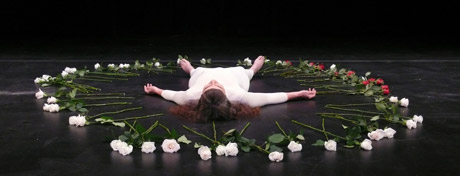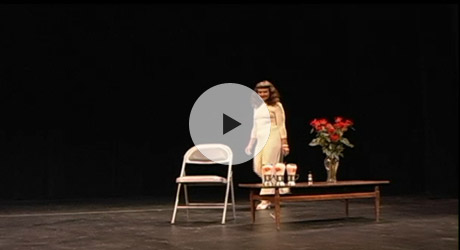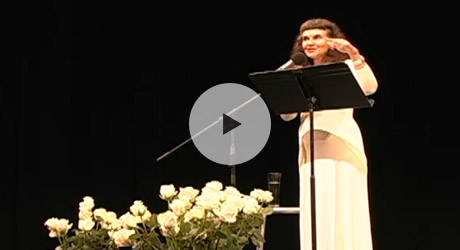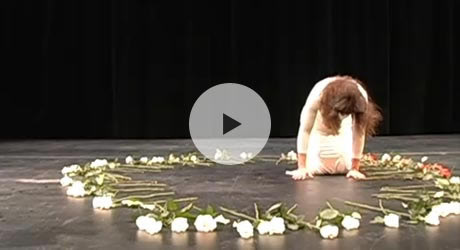
Goddess of Roses

Using roses as symbols of both spiritual and carnal love, as they have been since ancient times, I explore passion, pleasure, humanity, and divinity by speaking as Goddess of Roses, a deity from my imagination. I continue to develop a philosophy of pleasure from my experience as a woman and a lover, my research as a scholar, and my thinking and feeling as a person who observes the beauties and vulnerabilities of human beings. Gentleness, struggle, play, sex, religion, aging, and more all receive the rich attention and observation of Goddess of Roses.
The Goddess of Roses text is published in TDR: The Drama Review (Summer 2011).
I debuted Goddess of Roses in 2007 and consider it to be the beginning of a new path that includes greater freedom of expression. As examples, in the writing a seamless weaving of the personal and the scholarly happened without my thinking about it, and in the performance my spontaneous interaction with the audience was much more than usual and the comedienne in me emerged. Also, during the performance I experienced a clarity about myself in which the rational, the mystical, and the sexual felt wonderfully compatible and fluent, and that feeling remains with me.
View excerpt from the beginning of Goddess of Roses

Joanna Frueh, Goddess of Roses, University of Arizona, 2007. Video: Daniel Buckley
View excerpt from the end of Goddess of Roses

Joanna Frueh, Goddess of Roses, University of Arizona, 2007. Video: Daniel Buckley
The video excerpts here document the debut performance. I used to be very hesitant about the public display of video documentation of my performances. Reluctance came from my belief that video documentation does no justice to the live performance, even if the video is technically sophisticated, meaning that sound, light, and camera work have been very controlled according to the artist's specifications. Before 2009, when I documented the debut of Sexual Advances in a pretty basic way and with the intention to use it on my website and in other public venues, I thought that video documentation of my performances was hopelessly flat, vocally, visually, and emotionally, which is why I recreated some pieces in studio. I do not equate them with the performance. They are pieces unto themselves.
My revised opinion about showing video documentation of my live performances means that where once I thought that nothing truly conveys a live performance, now I think that all forms of its documentation hold some reality of a live performance. Also, I no longer believe that someone must witness a live performance of mine, the original source, in order to adequately feel, study, or understand my work. That said, neither the color—reddish—of the Goddess of Roses video nor the perspective—foreshortened—are as aesthetically pleasing to me as could be.
View the entire video of Goddess of Roses

Joanna Frueh, Goddess of Roses, University of Arizona, 2007. Video: Daniel Buckley
Contact
For more information




